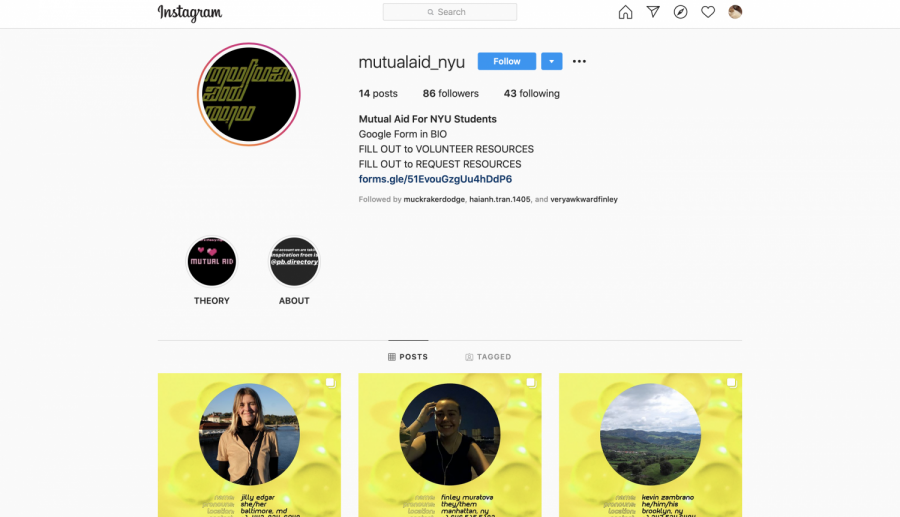Citing NYU’s poor administrative response to the pandemic, students have created a mutual aid network via Instagram to assist those most affected by the pandemic.
The network — which laid out its goals on Sunday, April 26 — aims to facilitate the sharing of resources and support within the NYU community, including safe housing, groceries, deliveries, cleaning supplies and monetary aid. The mutual aid network has 11 volunteers to date, a majority of whom reside in New York City, Baltimore and Pittsburgh.
The network was conceived following the Monday, March 16 email sent by President Andrew Hamilton, in which students were told to evacuate university housing by Sunday, March 22, a decision that left many students scrambling to find a place to stay for the duration of the semester.
After being inspired by multiple petitions and individual aid offers, CAS junior Zoya Ghazi wanted to create an organized space where the NYU community could request aid or be volunteers. This led to the formation of a Google form to fulfill Ghazi’s aim.
“For the amount of students being displaced who would perhaps not receive an exception from NYU to remain in student housing, there is a similar amount of vacancies from students leaving New York for homes they can safely return to,” the Google form reads. “The goal here is to match up resources so that people have one place to go where they can both offer what they have and find what they need.”
While lots of networks are operating at a local or regional level, Ghazi wanted a more sustainable and accessible network for students attending NYU.
“I started with the help of some close friends, but it’s all reliant on people sharing with their friends and those friends sharing it with theirs, and so on,” Ghazi said. “Other institutions have met student demands, and the NYU administration should be taking notes.”
The first post on the network’s Instagram features a Twitter screenshot that highlights how Emory University provided $1,000 for every low-income student with the Student Support Stipend. Additionally, the Emory Together Fund of $5 million is being allocated for students and faculty most hit by COVID-19.
“Someone get this onto Andy’s mood board, quickly,” the caption said, referring to NYU’s President Andrew Hamilton.
Like Ghazi, Tisch senior Kay Scinto said she feels NYU needs to follow examples set by universities such as Emory to better aid students. She’s offering to help with groceries and deliveries in Connecticut and provide resources such as toilet paper, kitchen rolls and first aid supplies.
“My biggest motivation to volunteer was feeling like not enough was being done by NYU,” Scinto said. “So since the administration wasn’t being there for us, it feels like it’s our duty as a community to try to be there for each other at least.”
CAS junior Avery Peterson has also volunteered for Mutual Aid for NYU Students. Located in the New York City area, she’s offering to help people pick up groceries and make deliveries.
“The mutual aid network is able to connect students in need of support to students wanting to do more to help across the country,” Peterson said. “Volunteers can elect different services to specialize in that they are most comfortable with. Support [is] tailored to the skill sets of the volunteers so that the volunteers can do the greatest good that they are able to.”
Volunteers have been remotely responding to requests as well.
“Some volunteers have even offered to help find legal recourse due to the racial violence existing in this crisis,” Peterson said. “[They] have offered to help write professional emails to help fight for the rights of our student community.”
The mutual aid network stands in solidarity with other organizations attempting to bring structural change to this pandemic, such as NYU Students Demanding Care, NYU COVID Coalition and NYU Student Labor Action Movement.
With NYU’s students looking for ways to share their wealth of resources, Ghazi believes that the mutual aid network provides the right forum to do so.
“Our aim is to also promote individual action so that there aren’t any students left in the lurch and struggling to survive, let alone study, especially during a global pandemic,” Ghazi said. “It’s been abundantly clear over the years that this is something NYU has failed to address appropriately.”
For any questions or concerns, the organizers can be contacted by email at [email protected] or via direct message on Instagram at @mutualaid_nyu.
Email Roshni Raj at [email protected]


























































































































































